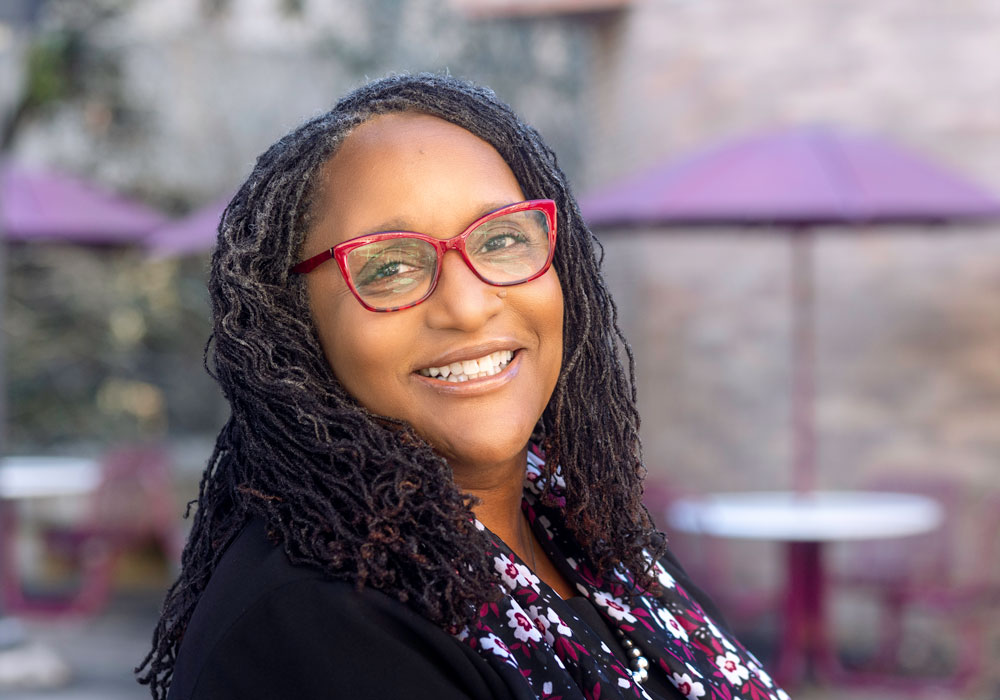In 2021, Gayenell Magwood was at a crossroads in her career. She could retire or contribute more to her field. After two decades at the same institution, she was ready for a change in environment. But she still felt led to continue supporting and mentoring fellow nurse scientists.
“I wanted to be in an organization that valued my contributions, was progressive and aligned with my values and vision. I was being recruited across the country, I turned down opportunities and was about to decide to leave the state,” she says.
Then, Magwood was invited to USC as a visiting professor and was impressed. She felt at home — some of the faculty were her former students. She learned about the college faculty experiences and saw threads of commonality.
“Everything that I had wanted to do in this phase of my career and what other organizations tried to offer was right here at USC. I chose joy,” she says.
So after more than 20 years at the same institution where she served in several positions before becoming an assistant professor and then earning tenure, Magwood joined USC's faculty as an endowed professor of nursing in 2022.
College of Nursing Dean Jeannette Andrews was Magwood’s associate dean of research while both were employed at the Medical University of South Carolina.
“She managed people up in their positions. She was hands on in building the research department. She understood community and knew when to stand back,” Magwood says. “She and I worked together to build community centers in Charleston. When Dean Andrews left for USC, she told me she felt there was a greatness that could be developed — I feel the same now.”
USC is giving Magwood the opportunity to contribute, mentor and give faculty a voice. Today, she is energized by having the opportunity to focus on health equity and disparities in underserved populations and community-based research and engagement.
She is also passionate about her involvement with the American Heart Association, which she believes is inclusive and offers a place for everyone. Magwood meets and collaborates with researchers and clinicians at the local, regional, national and international level. The foremost experts with innovative research that informs prevention and treatment for cardiovascular and stroke are involved with the association.
“As a private citizen, I am also able to participate in advocacy through AHA. As a scientific reviewer, AHA was the first experience for me that included nonscientific reviewers in the formal review process,” she says.
As a nurse scientist, Magwood contributes to her profession in various leadership roles on the Council on Cardiovascular and Stroke Nursing. The heart association has also provided her with leadership training through their Research Leaders Academy. And Magwood has been able to contribute through formal and informal mentoring of other cardiovascular stroke researchers through AHA, while also bringing these skills to her home institutions.
Magwood met nurse leaders through the Council on Cardiovascular and Stroke Nursing who supported her work to address racial, ethnic and rural disparities through community-engaged health equity research.
“My first personal encounter with AHA was after a family member was diagnosed with a rare cardiac condition. Professionally, I began with AHA as a basic life support instructor. And I was also Advanced Cardiovascular Life Support trained when I worked as a trauma/critical nurse. Now as a nurse scientist, my research program aligns with AHA — my team and I were funded as a center to address cardiovascular stroke disparities through a research network mechanism at AHA. This work directly contributed to my currently funded R01.”
A Research Project Grant (R01) from the National Institutes of Health provides support for health-related research and development. As the original and historically oldest grant mechanism used by NIH, an R01 grant is considered the gold standard for researchers.
Nursing was a second career for Magwood. She moved to Charleston during her early teens. Later, she focused her work on social services after graduating with her first degree, a bachelor’s in psychology and mass communication from Winthrop University.
Next, she attended MUSC earning her BSN. Then, she pursued her MSN in advanced clinical nursing at George Mason University. Following graduation, she became a trauma cardiovascular nurse in Washington, D.C.
“Everything that I had wanted to do in this phase of my career and what other organizations tried to offer was right here at USC. I chose joy.”
Now at USC’s College of Nursing, Magwood focuses on community research and engagement, cardiometabolic risk and prevention, and cancer control and prevention. She continues her work and involvement with the American Heart Association. During February, American Heart Month, she hopes to raise awareness for heart disease and stroke through efforts such as National Wear Red Day, an initiative by the heart association to increase women’s heart health awareness.
Cardiovascular disease is the No. 1 killer of women, causing one in three deaths each year, according to the American Heart Association. In South Carolina, heart disease was the leading cause of death for 2020. The Department of Health and Environmental Control reports that heart disease accounted for 75,886 hospitalizations in South Carolina during 2020, with total hospitalization charges of more than $6.8 billion.
“It’s important to raise awareness because most adults have at least one risk factor for heart disease,” Magwood says. “Raising awareness also provides opportunities for us to share heart-healthy information and resources.”
According to the heart association, simple changes like regular physical activity and a healthy lifestyle can help prevent many cardiovascular diseases.
